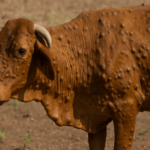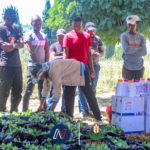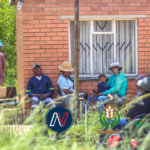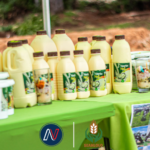In the highlands of Lesotho, where the soil crumbles beneath both the feet of farmers and the weight of long-standing agricultural traditions, one man has dared to reimagine what it means to farm—and to fail.
Lepeli Moeketsi, a 45-year-old farmer based in Peka, Leribe, is not just a producer of crops—he is a student of the land, a reformer of old methods, and a community pillar who has come to understand that farming is not about brute strength or luck, but about informed, strategic resilience.
Raised in Qhoali, in the district of Quthing, Moeketsi grew up in a household sustained by the land.
His mother sold crop produce while his father raised livestock. Their modest income fed, clothed, and educated three boys.
But despite the backdrop of agriculture that surrounded his upbringing, Moeketsi did not dream of becoming a farmer. His ambitions led him to Masitise High School and then later to Lerotholi Polytechnic, where he earned a diploma in construction management.
Yet life has a way of circling us back to the soil from which we came.
While tagging along with his older brother and their friend, Nkaku Kabi, he recounts how he was first exposed to the concept of commercial farming.
The stories about Kabi’s father—a successful farmer with high yields—sparked something within him. For the first time, he says he realised that farming could go beyond subsistence; it could be scalable, profitable, and transformative.
After finishing his diploma, rather than settling into construction, Moeketsi chose to follow the pull of the land.
In 2012, he bought his first tractor in Bethlehem, South Africa, and began working as a subcontractor for country’s Ministry of Agriculture under their block farming initiative.
“This was not the glorious start of a smooth entrepreneurial journey—it was a trial by fire,” he describes saying government cheques were delayed. Inputs were expensive. And even though he managed to purchase a second tractor by 2014, thanks to a risky bank loan, his efforts were still constrained by bureaucracy and the realities of smallholder farming.
Still, he pressed on.
Moeketsi did not own land—but he did not let that stop him. He found ways to rent idle fields from other Basotho, agreeing to compensation through produce or cash.
“The idea that young people cannot venture into farming because they don’t own land is misleading,” he says.
“Land renting and block farming make access possible. We just have to think creatively Block farming or renting land is the cheapest way to access land,” he explains.
His early years were marked by the backbreaking, intricate work of planting wheat. But the high labour demand and costly equipment made wheat a poor choice.
Pivoting with agility, he turned to beans—specifically, pinto beans and for seven years, this crop defined his identity as a farmer.
Then came the rainy season.
Between 2020 and 2023, excessive wet seasons wreaked havoc across Lesotho’s agriculture sector leaving farmers with spoiled crops.
In 2021, Lepeli lost a staggering 50 hectares of NUA45 and Nodak Pinto beans—his most promising season yet.
Beans worth M1 million rotted in the soil. Worse still, the entire operation had been financed by a bank loan.
“The loss wasn’t just financial. It was emotional. It was humbling. But it was also a turning point for me as a farmer.”
In defeat, Lepeli did what all great entrepreneurs do—he researched. He networked. He learned.
“I realised that beans are too sensitive to the ever changing climate and the effects of Climate Change. They don’t do well in drought, and they fail in excess rain,” he explains.
“I then decided to reinvent myself and I started looking into maize production.”
At first, he says he was sceptical especially considering the profit possibilities after harvest.
“Mealie meal is cheap and I wondered if this could be profitable. While I knew I still wanted to be a successful farmer, the decision to change to maize was a tedious one. I engaged with other maize farmers, reviewed climate-smart seed varieties and seeing the sustainable potentials, I started to see maize differently.”
In 2022, he narrates that he transitioned fully into maize cultivation.
“That decision was not a step backward—it was a step deeper into strategic, informed farming and transformation,” he says.
And it was this shift that would redefine his mission.
Maize, it turns out, had more potential than Moeketsi ever anticipated. It tolerated hailstorms. It grew steadily. It responded well to timing and precision.
Eager to share his knowledge and showcase the power of good research and quality seeds, he partnered with German seed company Bayer to organise a farmer’s day demonstration in Peka a fortnight ago. With the support of the Ministry of Agriculture, Food Security, and Nutrition—and Bayer’s local agent, Mpho Sekonyela—he demonstrated four maize seed varieties, each tailored to different climatic and soil conditions.
The demonstration wasn’t about marketing; it was about information. It was a show of real time evidence that precision agriculture, research and transformation are key ingredients to successful commercial farming in Lesotho in the height if climate shocks.
He introduced varieties such as;
- DKC 73-72, known for maturing in just 123 days.
- DKC 77-22, which takes up to 135 days and offers closed tips to reduce rot.
- DKC 74-20, a tiller-heavy variety known for strong resilience.
- DKC 72-70, a tall, double-cob variety making its debut in Lesotho, all which he produced and demonstrated for local farmers to physically see.
These varieties gave farmers options. But more importantly, Moeketsi gave farmers hope.
His pivot to maize is not just about seeds. It is about systems. He now advocates for farmers to focus less on land ownership and more on knowledge.
“It’s not about how much money you have or how much land you have. It’s about how much you know, how much you are willing improve in learning,” he insists.
Reading, he says, is his weapon.
“I read every pamphlet, every guide, every label, every book recommended, every article I come across. I read to understand advances, I read to learn new practices, I make sure I am as knowledgeable as I possibly can. ”
He stresses the importance of understanding pesticides, fertilization, and soil history.
“Some chemicals stay in the soil for 24 months. You need to know that before planting anything.”
He says he has also learned to start small.
“Do the right practice on a small scale before you gamble with 50 hectares lest you lose everything all at once,” he advises, saying the temptation is always to go big, “…But farming rewards precision, not scale.”
He shares that fertilizer subsidies have taught him another key lesson: “don’t over-plant what your subsidy cannot cover. Time management, too, has become a critical factor—especially with grains that are sensitive to planting dates.”
Moeketsi sees research and collaboration as the future of farming in Lesotho.
His farmers’ day events draw hundreds of farmers and agriculture enthusiasts from both Lesotho and South Africa.
He stresses that his passion is to ensure that Basotho farmers become the standard—no longer looking across the border to South Africa’s farming sector as the benchmark of success, but should level up the play field and compete.
“I want people to look at our fields and say, ‘This is what good farming looks like,’” he says.
He also believes the government and financial institutions must play a stronger role—not just in loans, but in risk protection, seed certification, and post-harvest market access.
“We can’t talk about food security when our policies are reactive. We need proactive investment in seeds, training, and infrastructure. At every turn, collaboration has been the backbone of my progress. From working alongside the Ministry and Bayer, to engaging other farmers, to educating youth. I strongly believe my story is less about individual triumph and more about collective movement which I hope will trickle down to others if we want to change Lesotho’s agriculture success story,” he says.
Moeketsi’s fields in Peka now stand not only as a source of food but as a symbol of what’s possible when resilience meets knowledge, and when ambition is backed by a support system.
“I don’t just dream to grow crops—but to cultivate a generation. A generation of farmers who understand their soil, who respect timing, who invest in research, who know their chemicals, who leverage public-private partnerships, and above all, who learn from every harvest, good or bad.”
Lepeli Moeketsi is no longer just a man with a tractor. He is a force. A leader. A farmer who understands that crops grow best when the farmer grows, too.
And perhaps that’s the biggest lesson of all: in the fertile soil of knowledge, failure becomes compost for success.








